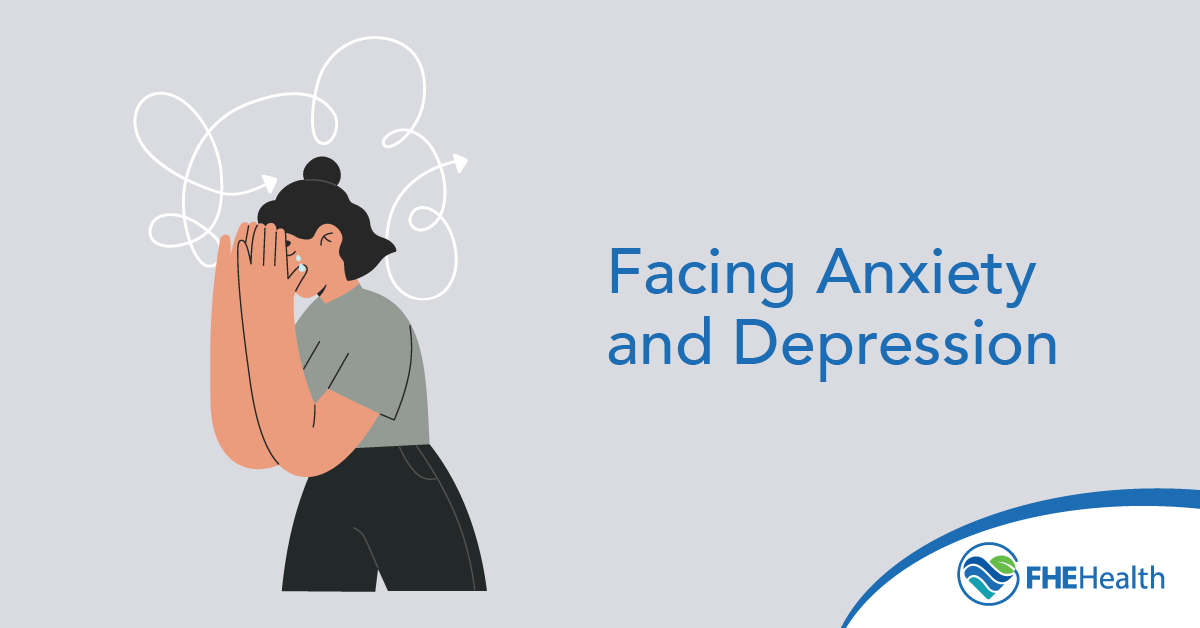
Have you ever heard friends say they feel anxious about an upcoming event or depressed about a bad situation? These words are commonly used for temporary, fleeting emotions, but anxiety and depression disorders are anything but fleeting.
Understanding Anxiety and Depression
The National Institute of Mental Health cautions that anxiety isn’t an occasional, appropriate concern. It’s more of a constant emotion that never seems to go away, even if the seemingly related concerns are addressed.
These often-debilitating conditions are prevalent. A 2023 Gallup Poll found that 29% of respondents had been diagnosed with depression in their lifetime. These findings showed a 10% increase over a similar poll taken 8 years prior, indicating depression and anxiety are on the rise.
How These Conditions Often Overlap
The Mayo Clinic notes that, while they’re separate disorders, anxiety and depression often appear together — a situation known as comorbidity in diagnostic medicine. The triggering events for both disorders often “feed” one another. For example, anxiety that you won’t do well on an upcoming test might trigger depression that you’ll never be successful in life, and vice versa. Thankfully, treatments for the conditions are also similar, which helps patients looking to improve their mental health and quality of life do so more efficiently.
With such a strong link between the two, it may be tempting to wonder if anxiety causes depression or if it’s the other way around. The answer is both — prolonged, untreated appearances of one disorder can lead to the other, which is why expedient, dedicated diagnosis and treatment is so important.
Common Symptoms and Warning Signs
As with any condition, diagnosis will vary from patient to patient and will incorporate everything from lifestyle and environment to relationships. Generally speaking, however, both anxiety and depression symptoms must appear consistently with outsized severity to potential triggering events to inform a diagnosis.
As a broad example of anxiety, double-checking you’ve locked all your home’s doors before a weeklong vacation is understandable. Habitually double-checking every door and window in your entire home before leaving each day and getting persistently distracted at work, imagining burglary scenarios is not.
Depression may look like dropping out of a club you once loved, avoiding get-togethers with friends because you no longer feel excitement about them or letting hygiene habits lapse. It may also look like avoiding leaving your home for extended periods of time, even when you aren’t sick.
The consistency, severity and intrusiveness of these thoughts and actions are what sets them apart, even though there are some subtle differences between anxiety and depression.
Strategies for Managing Daily Struggles
Getting through each day with anxiety and depression can seem overwhelming, particularly if you have no tools to combat the intrusive thoughts and beliefs distracting you. Getting a proper diagnosis and guidance from a mental health professional can help, as can techniques such as cognitive behavioral therapy, which arms you with responses to potentially negative mental narratives.
Treatment Approaches and Support Options
Treatment plans for anxiety and depression depend on the severity of your symptoms and how well you respond to therapeutic intervention. For some individuals, talk therapy alone may suffice, while others may need additional support from medication. Both paths are valid and helpful to the individuals who need them. If you aren’t sure which approach would work best for you, talk it out with your mental health professional or team. They’ll be able to advise you on benefits, challenges and ways you can change your lifestyle to support your well-being.
Building a Sustainable Path to Recovery
If you’re worried that you have anxiety or depression, it’s time to talk to your doctor or another medical professional about getting assessed. Generally, you’ll be asked to go through a series of questions about your symptoms and their frequency, after which your results will be discussed and treatment options offered. It’s important to commit to your treatment plan, even if you struggle at first. You deserve to feel healthy and whole in your life, and that begins with tackling what you can, diagnosing what you can’t and working with your medical team to overcome the anxiety and depression symptoms that have been holding you back.
Get Help Facing Anxiety and Depression Today
Connect with the team at FHE Health to find out how we can help. We offer a variety of treatment options for anxiety and depression, and our caring counselors can recommend immediate steps for you.






